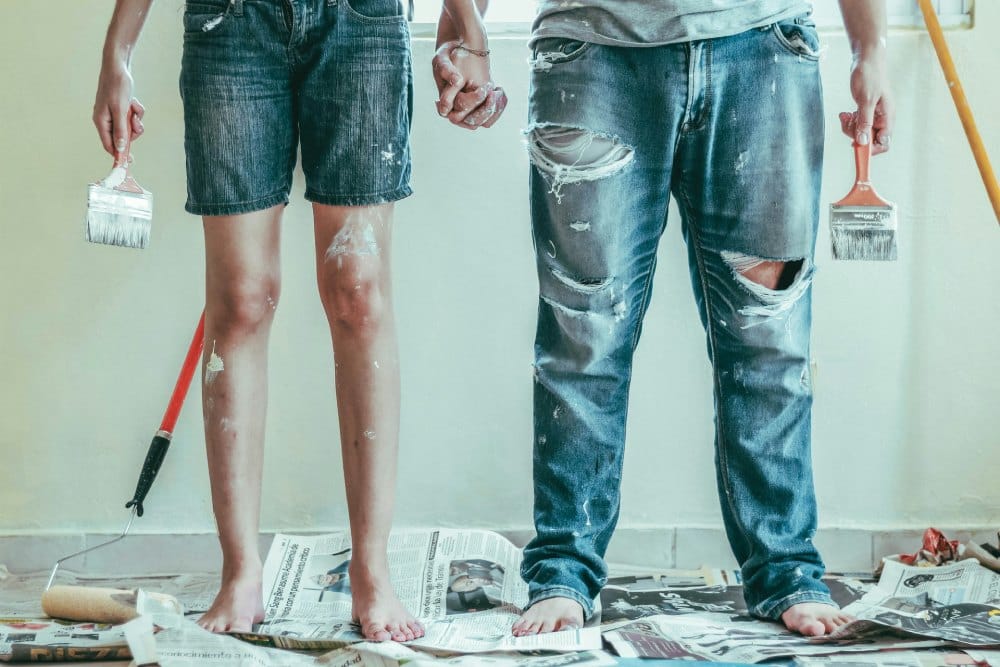Home Reno? 10 Tips to Keep Life on Track During the Chaos
Planning to live in your home during a renovation? You might want to read this first.

So you finally started that renovation project you’ve been putting off. Now, you have to survive living through your home repair. No matter how much planning you do, renovations are messy and can cause a lot of disruption in your life, especially if any unforeseen issues arise during the project.
Watching a renovation show and renovating your home while living in it are two different things. And while you might have done all the budgeting and planning for the project, it’s also essential to factor in how and where you’ll be while the renovations are underway. That’s why we’ve compiled a list of proven tips to help you keep your sanity as you live through a home renovation.
Find temporary living arrangements
Are you planning on living at home during the renovation? Depending on the size of your renovation project, temporarily moving to a different location while the project is underway can save you a lot of frustration and stress. This decision is especially important if you’re renovating major areas like kitchens or bathrooms that you need to access daily. Relying on your family or friends' house for meals and showers can be a temporary solution, but it’s not a practical one.

If you have kids and/or pets, you must remember that renovating your home will disrupt their routine and cause a lot of stress. The chaos of renovation can take a toll on the whole family, so moving elsewhere, if you have that option, is a practical solution. Consider a hotel, a short-term rental or staying with family or friends.

Make sure to budget for the cost of a temporary stay and any additional fees like Internet, food, toiletries, etc. If your renovation hits a snag and takes longer than expected, you'll easily overstay your welcome. That won't make anyone happy, especially if the short stay turns into a semi-permanent move.
Renovate in the right season
When it comes to more extensive renovations involving removing exterior walls or windows or the roof, timing is everything. This type of renovation is even more critical to plan if you intend to stay in your home during the project. It’s easier to tackle these types of renovations during warmer weather.

You don’t want to open walls and expose your plumbing in winter. Not only can that cause your pipes to burst, but the inclement weather can also damage your furniture and belongings.

Internal renovation projects like painting, bathroom floor tiling, or floor installation can be done at any time of the year. Remember that you might have to crank up the heat to speed up drying or open windows if there are any fumes from paint or other materials.
Invest in temporary storage
Consider renting a storage locker or a small container to avoid damaging your furniture and belongings during your renovation. During renovations, it’s very easy for your furniture or decor items to get damaged, even by accident. While you might want to pack up your tables, chairs or couches, ensure you keep enough items to have somewhere to sit and sleep, or you’ll end up sleeping in your bathtub.

As you get your home prepped for renovations, it’s a good time to go through all your items and declutter. Getting rid of things you no longer use or need can also help you organize your home better after the renovation. Get rid of broken or damaged pieces, or donate what you don’t need. Another great way to get rid of clutter is to hold a yard sale. This way, you can get rid of things you don't need or want and make way for new items.
Minimize dust during a renovation
Dust is a common and unavoidable side effect of renovations that can damage the air quality in your home. Construction dust is different from the variety you deal with regularly. During a renovation, there can be a lot of sanding, grinding and cutting of materials, which creates harmful dust made up of chemicals or harsh materials that can cause health hazards if inhaled.

The best way to deal with dust is to close off renovation areas of your home with plastic sheeting. Doing so will stop dust from penetrating other parts of the house and getting on your furniture. You might also want to use air filters and an air purification system. Talk to your contractor about dust control and preventing it from taking over your home.
Dust can be very harmful if you or anyone in your family has allergies or breathing issues. The same can apply to pets and children, which is also why you should consider alternate living arrangements during your renovation.
Reduce construction noise
Noise is an unavoidable part of renovation. While construction stops at night, it often starts early in the morning. This noise can disrupt your sleep and work, causing stress and communication problems, especially during calls or focused tasks.

Noise is an unavoidable part of renovation. While construction stops at night, it often starts early in the morning. This noise can disrupt your sleep and work, causing stress and communication problems, especially during calls or focused tasks.

Your municipality can also have rules about when construction can start and end, so make sure you incorporate that into your renovation project. You don't want to inconvenience your neighbors or have any noise complaints, as that can affect the completion of our project.
Arrange for alternative kitchen and bathroom access
The bathroom and the kitchen are the two rooms that you will definitely need access to in your house. If you’re renovating either or both of these rooms, you’ll need to have a plan for how you’ll cook and use these facilities during the renovation. Speak with your contractor to establish the exact renovation timeline to help you plan whether to make your meals on an outdoor grill or bring in a port-a-potty.

You can plan to prepare meals ahead of time so that if your stove is out of commission, you have something to eat. You can also opt for takeout, but remember that it might become costly after a while. Try to leave the toilet in as long as you can, but if you need to remove it, have a plan for your options. You can stay with family and friends or in a hotel where you can take a break from construction.
Minimize foul and toxic odors
In addition to dust, many construction materials can emit smells and odors that can be harmful to you and your family. Keeping windows open and running those air purifiers can minimize exposure to smells and reduce irritation. Make sure to avoid harsh cleaning products when you clean the rest of your home, as they can also add irritants since you’ll be cleaning more frequently.

Ensure you have building permits
Prior to commencing your renovation, it's crucial to ensure you and your contractor have the necessary permits for the work you’re planning on doing. While some renovation projects may not require a permit, others, particularly those involving demolition, structural changes, or building additions, do. It's also important to be aware that building inspections may be necessary to verify that the work meets all codes and regulations.

Make sure to work with a reliable contractor who is familiar with building codes and doesn’t cut corners. You can face hefty fines if you fail to obtain necessary permits, and if the work doesn’t pass inspection, you’ll have to invest more time and money to fix it. Contact your local municipality for more information and how to file the paperwork.
Invest in renovation insurance
Homeowner’s insurance is always handy, especially if your home is unexpectedly damaged or burglarized. While those types of policies protect your belongings, they might not extend to renovations. Renovation insurance covers you and the workers working on your home for the duration of the project. It can also protect you against any structural damage while your home is being worked on.

As your renovation is likely to increase the value of your home, you’ll also want to have your policy reassessed when the work is completed to ensure the coverage extends to renovated property. This is especially important if you build additions or significantly renovate your home.
Set a construction schedule and stick to it
Having a construction timeline and sticking to it is just as important as setting the budget for your project. Using a project management tool and regular check-ins with your contractor will help you stay on time and budget. Regular communication also ensures that you are aware of any issues or problems that might come up during the project.

The last thing you want is an unexpected problem that extends the renovation timeline and can put a big dent in your wallet. This can leave you living in a renovation mess longer until you have the resources to complete it.
Conclusion
As we discussed, renovations can be stressful for everyone. If you’re planning a big project, consider your family’s well-being during the renovation as much as you do the budget and design. Kids and pets can be significantly affected by large projects, and having a crew of strangers show up at your home can also add to the anxiety, so make sure you plan with everyone in mind.
These tips will help you plan for a renovation, especially if you plan on living through one in your home. No matter how long or stressful it is, the whole point of renovating is to create a more functional and improved living space. There is always a light at the end of that renovation tunnel, so let that keep you going even if it feels like the construction will never end.
Want to see what your home will look like after a renovation? Try out different ideas and styles with Planner 5D before you start actual work and save yourself time and money.
